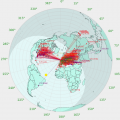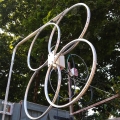rrobinet
I have configured several Kiwis for wifi access by attaching an inexpensive router configured as a Wifi client to the ethernet port of the Kiwi. This $25 TP Link has worked well for me:
https://smile.amazon.com/TP-Link-Wireless-Portable-Travel-Router/dp/B00TQEX8BO/ref=sr_1_14?keywords=tplink+wifi+router&qid=1548188019&sr=8-14
In principle one could enable the internal BB Wifi or attach a USB wifi adapter, but I am reluctant to fiddle with the Kiwi's OS.
About
- Username
- rrobinet
- Joined
- Visits
- 1,325
- Last Active
- Roles
- Member
- Points
- 9
-
8 channel Kiwi WSPR decoding script 'kiwiwspr.sh' using Raspberry Pi or other external server
Thanks. It is gratifying to be part of such an active and dedicated group.
Everyone using the Kiwi, especially for WSPR, should upgrade to v 1.242. It corrects a bug which introduced -40dB +/- 23 Hz sidebands to spots of > +10 dB SNR. Even more important, it appears to have improved SNRs by about 2 dB which means the Kiwi will detect low SNR spots which it missed before. -
8 channel Kiwi WSPR decoding script 'kiwiwspr.sh' using Raspberry Pi or other external server
Thanks. It is gratifying to be part of such an active and dedicated group.
Everyone using the Kiwi, especially for WSPR, should upgrade to v 1.242. It corrects a bug which introduced -40dB +/- 23 Hz sidebands to spots of > +10 dB SNR. Even more important, it appears to have improved SNRs by about 2 dB which means the Kiwi will detect low SNR spots which it missed before. -
8 channel Kiwi WSPR decoding script 'kiwiwspr.sh' using Raspberry Pi or other external server
Thanks. It is gratifying to be part of such an active and dedicated group.
Everyone using the Kiwi, especially for WSPR, should upgrade to v 1.242. It corrects a bug which introduced -40dB +/- 23 Hz sidebands to spots of > +10 dB SNR. Even more important, it appears to have improved SNRs by about 2 dB which means the Kiwi will detect low SNR spots which it missed before. -
Some Observations While Using the KiwiSDR to Spot WSPR Stations [fixed in v1.242]
-
8 channel Kiwi WSPR decoding script 'kiwiwspr.sh' using Raspberry Pi or other external server
Version 1.1e has been in reliable service at a number of sites for a week. To summarize a clean installation:
1) create the directory /home/pi/ham/kiwiwspr
2) copy kiwiwspr-1-1e.sh to /home/pi/ham/kiwiwspr/kiwiwspr.sh
3) run "chmod +x /home/pi/ham/kiwiwspr/kiwiwspr.sh"
4) run: "/home/pi/ham/kiwiwspr/kiwiwspr.sh -h" until you are no longer prompted to install any of the following programs:
The program will prompt you to install kiwirecorder.py. Download it from https://github.com/jks-prv/kiwiclient/tree/jks-v0.1 to /home/pi/ham/kiwiwspr/kiwiclient-jks-v0.1
The program will prompt you in install WSJT-x from http://www.physics.princeton.edu/pulsar/K1JT/wsjtx.html
The program will prompt you to install 'bc' by running: 'sudo apt-get install bc'
5) Edit the prototype configuration file '/home/pi/ham/kiwiwspr/kiwiwspr.conf' created during step #4 to reflect:
a) The name for your Kiwi(s), their IP addresses and Grid locator
b) The schedule of WSPR bands for it to spot. Configure only hour '00:00' if you want the same configuration 24/7
6) run "./kiwiwspr.sh -j a" to start the capture jobs defined in your kiwiwspr.conf
7) print the status of your jobs by running "./kiwiwspr.sh -j s"
Once "./kiwiwspr.sh -j s" lists capture and decode daemons for each of your configured bands:
8) run "./kiwiwspr.sh -w a" to start the watchdog daemon which will every 2 minutes verify that your jobs are still running and execute the configuration changes defined in your kiwiwspr.conf
"./kiwiwspr.sh -w a" will also configure your Pi so the watchdog daemon runs every time your Pi is powered up or rebooted.
Finally, each job writes 200 Kbps of wav data to files in /tmp/kiwi-captures/... If that file tree is at its Pi default location on the microSD, this writing will significantly shorten the lifetime of the microSD. To avoid that wear, configure your Pi's /etc/fstab to make /tmp/kiwi-captures/ a ramdisk file system:
pi@PiKPH:~/ham/kiwiwspr $ tail -2 /etc/fstab
### For kwiwwspr.sh capture files
tmpfs /tmp/kiwi-captures tmpfs defaults,noatime,nosuid,size=100m 0 0
pi@PiKPH:~/ham/kiwiwspr -
8 channel Kiwi WSPR decoding script 'kiwiwspr.sh' using Raspberry Pi or other external server
Version 1.1e has been in reliable service at a number of sites for a week. To summarize a clean installation:
1) create the directory /home/pi/ham/kiwiwspr
2) copy kiwiwspr-1-1e.sh to /home/pi/ham/kiwiwspr/kiwiwspr.sh
3) run "chmod +x /home/pi/ham/kiwiwspr/kiwiwspr.sh"
4) run: "/home/pi/ham/kiwiwspr/kiwiwspr.sh -h" until you are no longer prompted to install any of the following programs:
The program will prompt you to install kiwirecorder.py. Download it from https://github.com/jks-prv/kiwiclient/tree/jks-v0.1 to /home/pi/ham/kiwiwspr/kiwiclient-jks-v0.1
The program will prompt you in install WSJT-x from http://www.physics.princeton.edu/pulsar/K1JT/wsjtx.html
The program will prompt you to install 'bc' by running: 'sudo apt-get install bc'
5) Edit the prototype configuration file '/home/pi/ham/kiwiwspr/kiwiwspr.conf' created during step #4 to reflect:
a) The name for your Kiwi(s), their IP addresses and Grid locator
b) The schedule of WSPR bands for it to spot. Configure only hour '00:00' if you want the same configuration 24/7
6) run "./kiwiwspr.sh -j a" to start the capture jobs defined in your kiwiwspr.conf
7) print the status of your jobs by running "./kiwiwspr.sh -j s"
Once "./kiwiwspr.sh -j s" lists capture and decode daemons for each of your configured bands:
8) run "./kiwiwspr.sh -w a" to start the watchdog daemon which will every 2 minutes verify that your jobs are still running and execute the configuration changes defined in your kiwiwspr.conf
"./kiwiwspr.sh -w a" will also configure your Pi so the watchdog daemon runs every time your Pi is powered up or rebooted.
Finally, each job writes 200 Kbps of wav data to files in /tmp/kiwi-captures/... If that file tree is at its Pi default location on the microSD, this writing will significantly shorten the lifetime of the microSD. To avoid that wear, configure your Pi's /etc/fstab to make /tmp/kiwi-captures/ a ramdisk file system:
pi@PiKPH:~/ham/kiwiwspr $ tail -2 /etc/fstab
### For kwiwwspr.sh capture files
tmpfs /tmp/kiwi-captures tmpfs defaults,noatime,nosuid,size=100m 0 0
pi@PiKPH:~/ham/kiwiwspr -
In case there were any doubts.. [VP6D]
-
8 channel Kiwi WSPR decoding script 'kiwiwspr.sh' using Raspberry Pi or other external server
I have attached version 1-1e in which the watchdog daemon purges zombie wav files. I found that on a number of beta test systems the /tmp directory used to store the 2 minute audio sample files was completely filling the partition when the Pi lost contact with the Internet for minutes or hours. So this version fixes that problem and is in all other ways completely backwards compatible.
To upgrade: For safety save away your current kiwiwspr.sh, then *Replace* your current .../kiwiwspr.sh with the attached file. -
8 channel Kiwi WSPR decoding script 'kiwiwspr.sh' using Raspberry Pi or other external server
I have attached version 1-1e in which the watchdog daemon purges zombie wav files. I found that on a number of beta test systems the /tmp directory used to store the 2 minute audio sample files was completely filling the partition when the Pi lost contact with the Internet for minutes or hours. So this version fixes that problem and is in all other ways completely backwards compatible.
To upgrade: For safety save away your current kiwiwspr.sh, then *Replace* your current .../kiwiwspr.sh with the attached file. -
kiwirecorder.py crashes
I run multiple kiwirecorder.py client sessions on one server. At KPH there are two servers, one a Raspberry PI 3b, while the second server is an odroid. Both servers experience the crashes/restarts at about the same irregular rate. Currently both clients are configured to run 11 client sessions on each server. On the Pi, 8 sessions go to Kiwi76 and 3 LF sessions to Kiwi72. On the odroid 8 sessions go to Kiwi75 and 3 sessions to Kiwi72. The crashes occur on both servers and were occurring when only the Pi clients were running. I have experimented with configuring the Pi to run 20 clients, 8 to Kiwi76, 8 to Kiwi75 and 3 to Kiwi72 and the crash frequency went up significantly to several times per hour. I have two beta sites running my code, one on an odroid and a second on a x86 Debian, and both those sites experience crashes, but at lower frequency due to, I believe, both running 8 or fewer clients.




